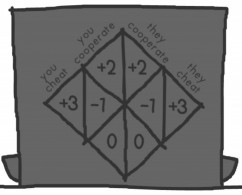Backstory
I was fiddling around with the Evolution of Trust and thought of this.
Warning: I recommend you go check it out first before attempting this challenge.
Summary for people who haven’t played
A quick summary of what it says on the site: there is a machine. If you put in one coin, your opponent gets three coins (and vice versa). You can either Cooperate (put in a coin) or Cheat (don't put in a coin).
Challenge
Given the name of a strategy (copycat, alwayscheat, alwayscooperate, grudger or detective) and the number of rounds, return/output a list of truthy (Cooperate) and falsey (Cheat) values that, when put against that strategy, will give you the maximum possible amount of coins. (I'm using Y for cooperate and N for cheat in my examples)
For clarification, check the Input and Output section.
Quick info for people who have played
The amount of rounds is given in the input. There are no mistakes, and the rewards for Cooperating/Cheating are the same as the site - see the image below.

Yes, this is basically a Prisoner's Dilemma - Nicky Case says this in the “feetnotes” of the game.
Also, "Cheat" is basically the same as Defect.
The characters
- Copycat
copycat - Always Cooperate
alwayscooperate - Always Cheat
alwayscheat - Grudger
grudger - Detective
detective
The characters' strategies from the site
- Copycat: Hello! I start with Cooperate, and afterwards, I just copy whatever you did in the last round. Meow
- Always Cheat: the strong shall eat the weak (always cheats)
- Always Cooperate: Let's be best friends! <3 (always cooperates)
- Grudger: Listen, pardner. I'll start cooperatin', and keep cooperatin', but if y'all ever cheat me, I'LL CHEAT YOU BACK 'TIL THE END OF TARNATION. (cooperates until you cheat once, then cheats you back for the rest of the game)
- Detective: First: I analyze you. I start: Cooperate, Cheat, Cooperate, Cooperate. If you cheat back, I'll act like Copycat. If you never cheat back, I'll act like Always Cheat, to exploit you. Elementary, my dear Watson.
Input and Output
Input is the name of the strategy and the amount of rounds in any order you specify, in a list, or a space-separated string.
Output is a list of truthy (Cooperate) and falsey (Cheat) values that, when put against the strategy, gives you the most amount of points.
Test cases
"grudger 3" => "YYN" or [<2 truthy values>, falsey]
"detective 5" => "NNNYN" or [<3 falsey values,> truthy, falsey]
"alwayscheat 7" => "NNNNNNN" or [<7 falsey values>]
"alwayscooperate 99" => <insert 99 N's here> or [<99 falsey values>]
"copycat 7" => "YYYYYYN" or [<6 truthy values>, falsey]
"detective 4" => "NNNN" (4 N's) or [<4 falsey values>]
"alwayscheat 999" => 999 N's or [<999 falsey values>]
"grudger 1" => "N" or [falsey]
Easy copy paste:
grudger 3
detective 5
alwayscheat 7
alwayscooperate 99
copycat 7
detective 4
alwayscheat 999
grudger 1
Rules
- This is code-golf, shortest answer wins, tiebreaks sorted by time(stamp) created
- Standard loopholes are not allowed, unless they are creative (e.g. asking for list input and using the fact that it is a list to shorten your code). No extra points are given for this
WD

detectiveas it is now. @Arnauld got it, thanks. @wasif Good idea, I’ll add it to the sandbox some day. \$\endgroup\$